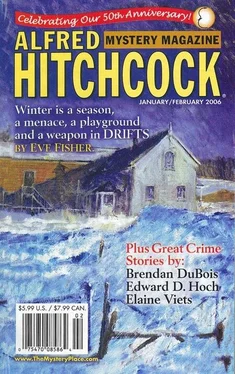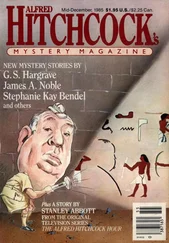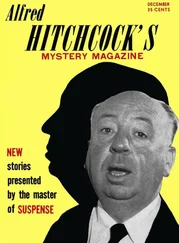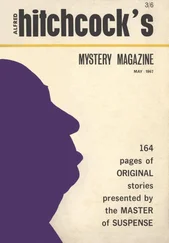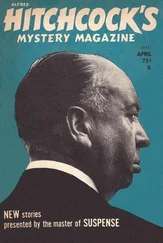John Betancourt - Alfred Hitchcock’s Mystery Magazine. Vol. 51, No. 1 & 2, January/February 2006
Здесь есть возможность читать онлайн «John Betancourt - Alfred Hitchcock’s Mystery Magazine. Vol. 51, No. 1 & 2, January/February 2006» весь текст электронной книги совершенно бесплатно (целиком полную версию без сокращений). В некоторых случаях можно слушать аудио, скачать через торрент в формате fb2 и присутствует краткое содержание. Город: New York, Год выпуска: 2006, Издательство: Dell Magazines/Crosstown Publications, Жанр: Детектив, на английском языке. Описание произведения, (предисловие) а так же отзывы посетителей доступны на портале библиотеки ЛибКат.
- Название:Alfred Hitchcock’s Mystery Magazine. Vol. 51, No. 1 & 2, January/February 2006
- Автор:
- Издательство:Dell Magazines/Crosstown Publications
- Жанр:
- Год:2006
- Город:New York
- ISBN:нет данных
- Рейтинг книги:4 / 5. Голосов: 1
-
Избранное:Добавить в избранное
- Отзывы:
-
Ваша оценка:
- 80
- 1
- 2
- 3
- 4
- 5
Alfred Hitchcock’s Mystery Magazine. Vol. 51, No. 1 & 2, January/February 2006: краткое содержание, описание и аннотация
Предлагаем к чтению аннотацию, описание, краткое содержание или предисловие (зависит от того, что написал сам автор книги «Alfred Hitchcock’s Mystery Magazine. Vol. 51, No. 1 & 2, January/February 2006»). Если вы не нашли необходимую информацию о книге — напишите в комментариях, мы постараемся отыскать её.
Alfred Hitchcock’s Mystery Magazine. Vol. 51, No. 1 & 2, January/February 2006 — читать онлайн бесплатно полную книгу (весь текст) целиком
Ниже представлен текст книги, разбитый по страницам. Система сохранения места последней прочитанной страницы, позволяет с удобством читать онлайн бесплатно книгу «Alfred Hitchcock’s Mystery Magazine. Vol. 51, No. 1 & 2, January/February 2006», без необходимости каждый раз заново искать на чём Вы остановились. Поставьте закладку, и сможете в любой момент перейти на страницу, на которой закончили чтение.
Интервал:
Закладка:
The second mate was also new to the ship, having been shipped at Fayal at the same time as Miguel. The old hands watched him warily, because this was the first time they had raised whales since he had come on board, and as he was over sixty, far too old for the whaling trade, they fully expected him to let them down. However, he stood like a gnarled warrior at his great steering oar as he sang out encouragement, and the boat pulsed on toward the spouting whales.
Then they were up to the pod. “Stand, Miguel!” the second mate cried as the boat drew up to the first huge bull, and the Portuguese harpooner put down his oar, and stood up in the bow, while the oarsmen watched him surreptitiously over their shoulders. Despite their blackest suspicions, he immediately made it obvious that he had done this many times before too. Without the barest hint of fear, he braced his thigh into the notch in the bow thwart, gripping the ash handle of the harpoon and aiming it unwaveringly as with a great stinking belch the bull whale spouted.
The second mate had steered well — the boat was directly in line with the hump. “Let him have it, Miguel!” he shouted, his tone quivering madly with excitement. Thump! went the iron, and the whaleline whistled out. Off went thirty fathoms as the whale startled, and then the second mate reached down and snubbed it to the loggerhead.
With a tremendous lurch the whaleboat straightened up, and then it surged forward at a cracking pace, tugged along in the wake of the whale. Spray flew all around them, and everyone — except for Wiki, who, being the most junior hand, had the job of bailing out — hung onto the sides. The Nantucket sleighride didn’t last long, because the whale tired out fast. After a few gigantic circles he slowed and then sank to a stop, and the old second mate ordered shakily, “Haul line, boys, haul line!”
His voice was so strange that Wiki looked curiously up at him, to see that the old man’s face was flushed scarlet and purple. The veins in his forehead stood out like worms, and his reddened eyes popped. The oarsmen in the bow were hauling hard on the whaleline to bring the boat up to the whale’s side, dragging it in and tossing loose coils into the bottom of the boat. This was the moment when the second mate was supposed to change places with the harpooner. He was meant to step daintily along the length of the boat to the bow, pick up the sharp-bladed lance, and finish off the whale. Instead, however, he dropped dead.
Wiki watched the old fellow double over, and paw feebly at the air. Then there was a big thud as he collapsed in a heap. For a moment, there was blank silence in the boat, punctuated by the swish of the sea and a snort and a slap as the whale recovered his wits and sounded, taking the line and harpoon with him before anyone could do anything about it. At that moment, everyone in the boat was too stunned even to notice the whale’s departure. Someone reached out a tentative hand and nudged the second mate, but it was already plain to all that he was lifeless.
As the boat’s crew marveled after they got back on board, his very last words had been, “Haul line, boys, haul line!” The sailors of the Paths of Duty thought that this was truly remarkable, much more notable than the manner of his death. The second mate had definitely been too old for the whaling trade, liable to heart attacks because of the moments of great excitement that whaling involved — as everyone knew, Captain Smith had hired him only because he was desperate for an officer. While it was bad luck to lose him so soon, no one could say it was unexpected.
Consequently, the funeral, when the captain said a prayer and the shrouded corpse was tipped over the rail into the sea, was almost perfunctory. Not only was he old, but over the three weeks since they had left the Azores no one had got acquainted with the old man. However, the ritual at the foremast next day, when the dead mate’s effects were auctioned off, was surprisingly solemn — or so Wiki noticed.
The captain presided, setting down the second mate’s sea chest at the foot of the foremast, and then holding up his few belongings — a couple of shirts, a pair of shabby trousers, a few pipes, and a small bag of tobacco — and calling out for bids. According to tradition, the money raised would be sent to the dead man’s family, something that not a soul on board the Paths of Duty believed for an instant, all of them being quite convinced that the captain pocketed the cash. However, the bids had come freely as men bought up the poor things, and the atmosphere had been remarkably somber — which, as Wiki found later that same day, had surprising consequences.
It was during the evening dogwatch, the time of the day when everyone on board relaxed a bit, and the routine of night watches hadn’t yet started. Wiki was on the foredeck quietly digesting his supper, when out of the corner of his eye he saw one of the harpooners lunge up and lean on the starboard rail beside him. His name was Isaac Norton. Wiki thought he might be a Martha’s Vineyard man because he had joined the ship at Edgartown. They hadn’t had much to do with each other: Norton was the harpooner for a different whaleboat and bunked in the steerage instead of the forecastle. So when Isaac cleared his throat, Wiki merely lifted his eyebrows and nodded politely before returning his contemplative stare to the quiet water.
Then he heard Isaac remark grimly, “I don’t want my gear sold off like that, not when I’m dead and gone.”
Wiki paused, not at all sure what to say. Auctioning off the contents of the dead man’s chest was the usual custom with whalemen, one that he thought quite sensible. Otherwise, not only would a place have to be found to store the dead man’s duds over the several-years-long voyage, but other seamen, who as a rule did not have much in the way of belongings, wouldn’t be able to put stuff he didn’t need any more to good use.
However, Norton didn’t seem to need a reply, as he went on broodingly, “I guess you don’t have customs like that where you come from. Don’t you bury it all with the deceased, or summat like that?”
Wiki shook his head, biting back a grin. “Quite the opposite. When someone dies, people come from miles around to collect on debts, and it’s amazing how much disappears.”
“That’s exactly it!” Norton exclaimed, animated.
“It’s actually a kind of ritual plundering, what we call muru, ” Wiki informed him.
“And that’s what I don’t want to happen!”
“No?” said Wiki. He wondered greatly where this conversation was headed.
“Nope,” said Norton firmly. Then he was silent a moment, his mouth pursing in and out as he stroked his stubbled chin and studied Wiki with sideways looks. Then he observed, “Folks tell me that even though you’re jest a Kanaka, you know how to read and write.”
“Aye, that’s true,” said Wiki, without taking umbrage. Though he was half American and the other half New Zealand Maori, he was so used to being called a Kanaka — the Yankee name for a Pacific Islander — that it didn’t trouble him any more.
“You’re sure?”
Wiki cast him an icy glance. “I told you — it’s true.”
“I didn’t mean to cast aspersions,” the harpooner said hastily. Wiki was big and well muscled, and had stood up for himself several times already this voyage. “It’s just I had trouble believing it,” Isaac Norton went on. “On account of you seem awful young to be educated. How old are you, anyways?”
“Seventeen,” said Wiki. Before he had left New Zealand, his mother had told him to be sure to remember that he had been born in the year 1814, as Yankees set great store by birthdays.
The other nodded. “I s’pose you was educated by the missionaries.”
Читать дальшеИнтервал:
Закладка:
Похожие книги на «Alfred Hitchcock’s Mystery Magazine. Vol. 51, No. 1 & 2, January/February 2006»
Представляем Вашему вниманию похожие книги на «Alfred Hitchcock’s Mystery Magazine. Vol. 51, No. 1 & 2, January/February 2006» списком для выбора. Мы отобрали схожую по названию и смыслу литературу в надежде предоставить читателям больше вариантов отыскать новые, интересные, ещё непрочитанные произведения.
Обсуждение, отзывы о книге «Alfred Hitchcock’s Mystery Magazine. Vol. 51, No. 1 & 2, January/February 2006» и просто собственные мнения читателей. Оставьте ваши комментарии, напишите, что Вы думаете о произведении, его смысле или главных героях. Укажите что конкретно понравилось, а что нет, и почему Вы так считаете.
